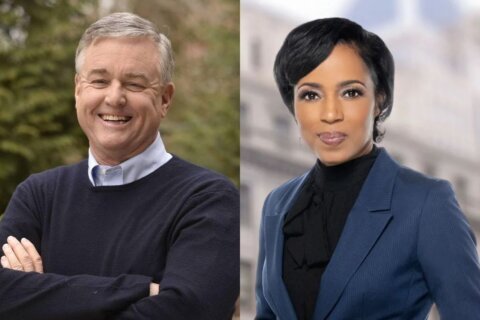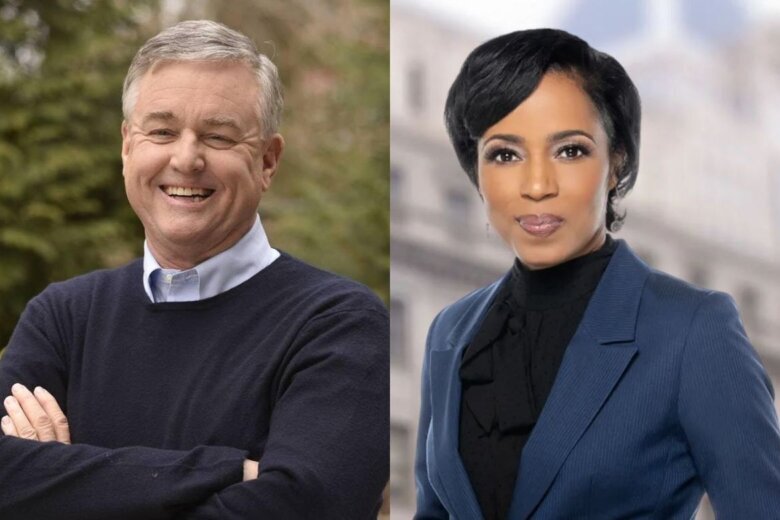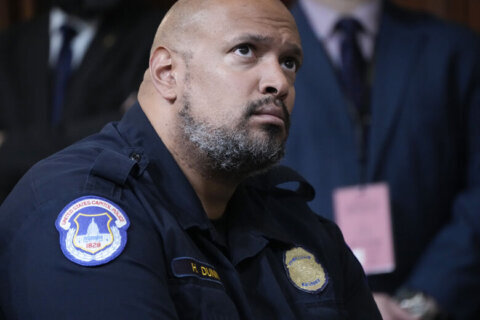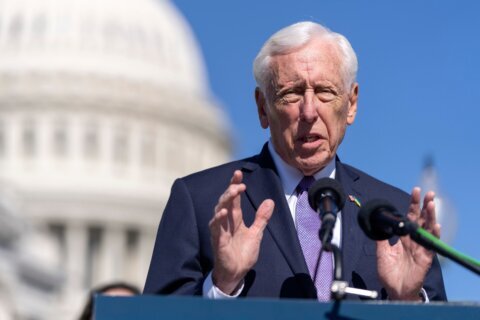Visit WTOP’s Election 2024 page for comprehensive coverage.

There’s less than a week to go before primary day in Maryland — and the top two candidates in a crowded Senate race to succeed retiring Sen. Ben Cardin could be locked in a closer race than many public polls indicate.
And while early voting is already underway, both leading candidates — Prince George’s County Executive Angela Alsobrooks and U.S. Rep. David Trone — acknowledge there are still many Democrats undecided about who they ultimately want to vote for. In part, that’s because on many of the issues, both candidates hold fairly similar positions.
In interviews with WTOP this week, both candidates say they’re best equipped to defeat former Gov. Larry Hogan in November and to protect abortion rights in Maryland, and they each took nuanced views on the situation in Gaza.
- Listen to the full interview with Angela Alsobrooks and read a transcript
- Listen to the full interview with David Trone and read a transcript
- Maryland 2024 primary election voter guide: Everything you need to know
With so many Americans disenchanted with politics, and the two leaders at the top of the ticket in November, they both also acknowledged that there’s a growing suspicion about what gets done on Capitol Hill and its impact on regular people.
The economy and government
Alsobrooks, who is in her second term as executive of Maryland’s second-largest county, says she wants to raise the corporate tax rate.
“My concern is that when we look at things like the corporate tax rate, where big corporations pay fewer taxes than hardworking Americans, this worries me,” said Alsobrooks. “It is the kind of thing that I will tackle as a senator — raise the corporate tax rate to allow again for there to be not only more equity, but to allow the economy to grow in a way that benefits more people in the middle.”
Too many Americans feel the economy isn’t working for them, Alsobrooks said, citing issues like health care access and food deserts.
“I understand this feeling that the system is not working, and people are not wrong about it,” she said.
That answer came just a few moments after she was asked how she could help boost the economy in Maryland, where tax revenues aren’t able to cover rising costs, necessitating steep budget cuts.
If elected, she vowed to continue to push for federal investment in projects that will make a difference in Maryland. As examples of what she can accomplish in the Senate, she cited her efforts to help bring the FBI’s new headquarters to Greenbelt and a major redevelopment project at the New Carrollton Metro station, which have occurred during her tenure as county executive.
“I know not only what to vote for, but I know how to implement,” Alsobrooks said. “The implementation of this is what I will also bring to Maryland. It’s not just bringing back those dollars, but actually converting the dollars to real infrastructure in a way that will grow jobs.”
For his part, Trone, who sits on the House Appropriations Committee, said that he has a proven record in Congress of doing the same thing already.
“We’re going to focus on things that … can really make job growth — and that’s bringing home the dollars,” Trone said. “I brought home last year the sixth most dollars of any member in the Congress in the entire Democratic Party. That’s a big deal. Fixing Boys and Girls Clubs, creating centers for addiction control, mental illness centers, you know, really bringing change back and dollars back to our district. But we’ve got to drive jobs in Maryland. That’s key. And we’ve got to make Maryland more friendly to other states, other employers.”
When Trone was asked why so many Americans don’t feel like the system has worked for them, the three-term congressman said it’s because too many members of Congress are looking out for themselves and their bank accounts — instead of regular Americans.
“We need to put people over politics and that’s why I support term limits,” Trone said. He pointed to a measure to limit lawmakers to two terms in the Senate and six terms in the House and to limit Supreme Court terms to 18 years, with every president getting two appointees. In addition, Trone cited measures to ban stockholder trading by members of Congress and to stop them from becoming lobbyists.
“We need to make big changes in politics if we want to get people taken care of,” Trone said. “We can’t let the same old politics by the same old career politicians continue.”
Getting things done in the Senate
Both candidates back the elimination of the Senate filibuster.
Even when one party controls both chambers of Congress, a need for most legislation to clear 60 votes in the U.S. Senate makes it hard to pass too many big pieces of legislation. For Democrats, that means even if they had majorities in the House and Senate it would be almost impossible to codify the original Roe vs. Wade decision, make the District of Columbia the 51st state, or pass other legislation that might be popular with the left.
On the flip side, it also means Republicans would have a hard time passing a national abortion ban or outlawing same-sex marriage, to go with other pieces of legislation that might be more popular on the right.
But Trone and Alsobrooks both say that parliamentary procedure, requiring 60 votes to move things to a vote, needs to go.
“We certainly need to eliminate the filibuster,” Trone said. “But at the same time, we’ve got to work on bipartisanship. And I was ranked the fourth most bipartisan member of Congress last year. We passed 26 bills on mental health and addiction alone, plus Pell Grants for returning citizens to give them jobs. So we can get a lot of stuff done if we work bipartisan, and we can get to 60 votes.”
Alsobrooks said the filibuster has become “weaponized” in recent years, and that the exponential increase in its usage by senators in the minority party have hurt the “rights and freedoms of Americans” as a result.
Asked whether she was concerned that Republican majorities would simply reverse some of those progressive gains as soon as they returned to power, she said no.
“The history is that the filibuster has been used to block the kinds of legislation that would provide more freedoms,” she said. “And so it’s something that we’d have to look at how it’s done, but I support eliminating it and, at the very least, reforming the filibuster.”
Asked in a follow up why it’s so hard for the Senate to ever find 60 votes, Trone said lawmakers aren’t doing enough to find common ground on issues that actually exists.
“I take the time to get to know the other side of the aisle,” Trone said. “We need to sit down with the other side and find common ground. We can find common ground in education. We can find it on criminal justice. We can certainly find it on mental health and addiction. We can find it on business issues. But you got to take the time. The average career politician spends 30% to 40% of their time raising money. They don’t take the time to get to know the other side of the aisle. And that’s what you have to do to get stuff done for America.”
Israel-Hamas war and campus protests
Both candidates shared their views on the tensions around the world and America’s role in responding to them.
The conflict in Gaza has divided the Democratic Party in ways that few other issues have.
Both candidates took a nuanced stance on the situation there.
“We’ve got to get a two-state solution,” Trone said. “That’s the only possible way to go. We’ve also got to support our ally Israel and eliminate Hamas. I mean, we have to eliminate Hamas. At the same time, we’ve got to get to a cease-fire with the hostages released. That can’t happen too soon. I’m the co-chairman of the Abraham Accords Caucus and we need to begin to rebuild Gaza after that and help give folks there a real chance to have a life.”
Alsobrooks said she also still backs a two-state solution, though she acknowledged the “great complexity” of the situation.
“We are in a moment now where we are really very hopeful that we can, first of all, get the hostages returned and, second of all, get to an immediate cease-fire,” Alsobrooks said. “We have so many concerns regarding the extreme need for humanitarian aid to get into Gaza right now and to stop the killing of civilians. I think we also are in need of a two-state solution, the two-state solution that would allow us to have peace and security for Israelis and peace, security and self-determination for the Palestinians in Gaza. Two states for two people. This is also supported by President Biden — I agree with him on this.”
At the same time, she also criticized some of the sentiments expressed during protests that have erupted on college campuses around the country.
“I agree, I’m sure, with every parent and people who are watching this, that we believe that there is no place for hate on any campus … nor should we see assaultive behavior,” Alsobrooks said. “Our kids should not feel fearful. And so antisemitism should never be tolerated in any place, nor should Islamophobia or hate of any kind. There should be no safe space for that to happen and our kids deserve to be safe on these campuses.”
Trone took a slightly more critical stance, saying while he’s a big believer in free speech, “we can never allow the protests to erupt into violence, and we cannot let the protests impede others from going about their education, going about their job. That cannot be tolerated.”
So, where do the candidates feel they differ?
While there were some differences, both candidates took similar stances on the questions posed by WTOP. Asked what policy position they thought provided the most notable difference between the two, they each provided starkly different answers.
“I think our record on choice is probably the most notable difference,” Alsobrooks said. “I have never compromised my values where choice is concerned and it is the case that Congressman Trone has given hundreds of thousands of dollars, both in his personal capacity, as well as through his business, to some of the most radical Republicans who have passed … very restrictive anti-choice policies across the country.”
She pointed to Texas official Greg Abbot and Ken Paxton, plus Brian Kemp in Georgia.
Alsobrooks added, “This is an issue that is of great concern to me, other women and families across the country, especially someone like me. I have an 18-year-old daughter, and I want to make sure that we have in the Senate a person who will fight vigorously, not only for abortion care rights, but reproductive freedom. This is a very personal issue for me.”
Trone, who has spent tens of millions of his own dollars on the race already, criticized Alsobrooks for raising money from special interests to fund her campaign.
“She takes special interest money from Exxon, who is not helping us with the environment; from Pfizer, who’s not helping us get low drug prices; from Cigna, who is not helping us on the mental health challenges,” Trone said. “It’s that special interest money. That’s where the biggest difference is.”
Who can beat Hogan?
Ultimately, while the race has turned negative in recent weeks, generating harsh feelings between the candidates and their supporters, neither candidate seemed willing to suggest those hard feelings will linger into the general election.
In fact, both said they were willing to help the other defeat Larry Hogan or whoever else becomes the Republican nominee, though not before each of them expressed confidence that they would be the one who prevails in the primary.
“I’ll continue fighting to make sure first, that we retain the seat, that the Democrats retain the majority in the Senate,” Alsobrooks said. “I believe I’m the person also to beat Larry Hogan in the general election because there has not been a single poll — after $57 million that David Trone has spent — there’s not been a single poll that has shown him ahead of Hogan. And so I will not only have the people in the general election, but will have the resources to beat Larry Hogan as well.”
When asked the same question, Trone said: “We’re going to support the Democratic candidate as we move forward. But right now the polls look excellent. People are responding to our mission of people over politics. They’re responding to the fact that we’re not taking special interest money. And we have a record, a real record that nobody else has, for three terms in Congress of being on a mission. I don’t need this job. I’m here on a mission to get stuff done to make America a better place.”
When each candidate was pressed about whether they would actually campaign for the other, they each said roughly the same thing.
“I’m willing to support, yes. I will support if he is successful,” Alsobrooks said. “I will support him in the general election.”
Trone gave almost the exact same answer.
“We’re actually going to support the Democratic nominee,” he promised.
There are eight other Democrats running for the Democratic nomination. They are: Michael W. Cobb, Sr., Marcellus Crews, Brian E. Frydenborg, Scottie J. Griffin, Robert K. Houton, Joseph Perez, Steven Henry Seuferer and Andrew Jaye Wildman.
Get breaking news and daily headlines delivered to your email inbox by signing up here.
© 2024 WTOP. All Rights Reserved. This website is not intended for users located within the European Economic Area.









